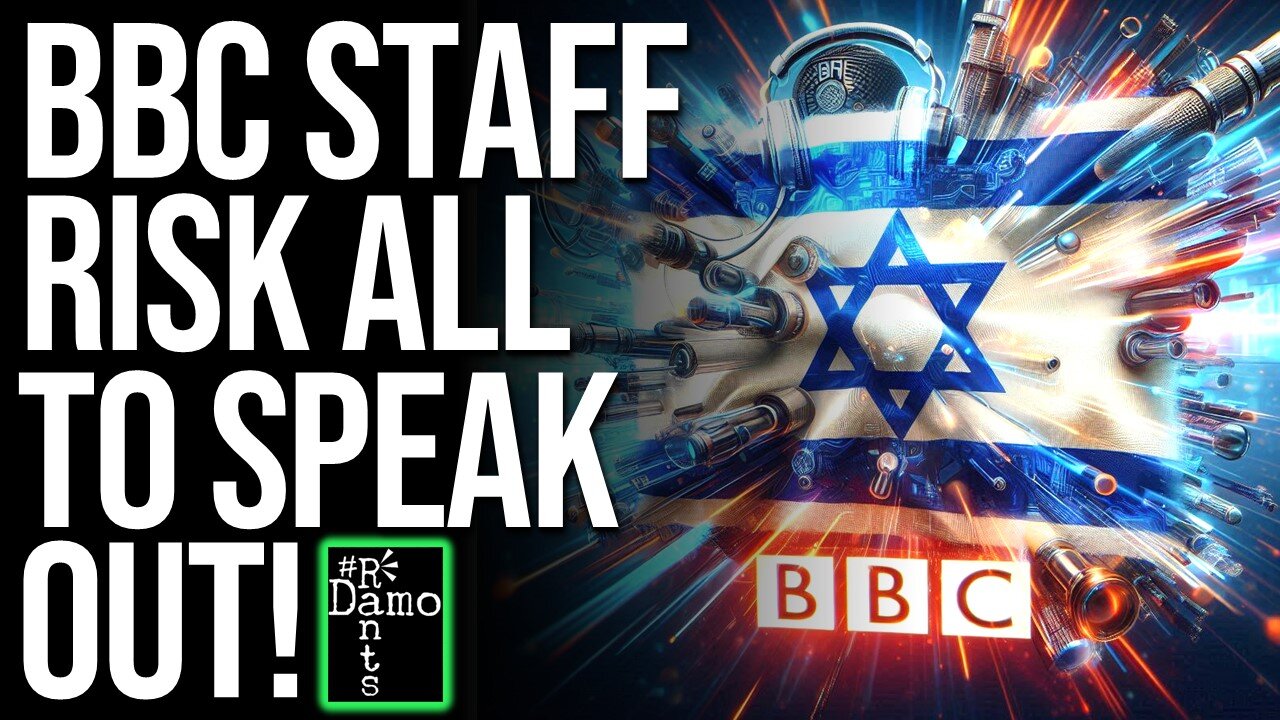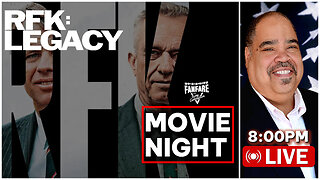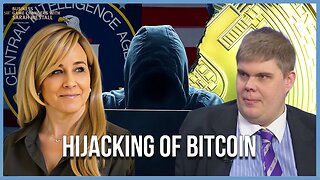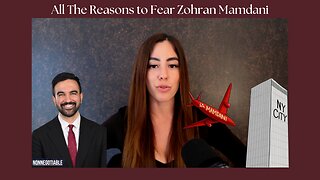Premium Only Content

Why Is the BBC Protecting Israel? Staff Blow the Whistle
Right, so it’s not every day that the BBC, the self-styled bastion of British impartiality, finds itself accused of censorship and racism by the very journalists it employs. But when over a hundred of its own staff take the unprecedented step of calling out the broadcaster for acting like Israel’s unofficial PR department, it’s clear something has gone terribly wrong.
Once praised for “telling the truth to power,” the BBC now stands accused of suppressing it—silencing Palestinian voices, burying war crimes, and hiding behind the hollow shield of “balance” while Gaza burns.
Instead of reporting the news, the BBC has become it—entangled in scandal, censorship, and a deepening crisis of credibility.
And at the centre of it all sits Sir Robbie Gibb, a board member whose fingerprints, critics allege, are all over the broadcaster’s lurch toward political obedience. This is not just editorial misjudgement; it is, according to its own staff, institutional betrayal.
Right, so the BBC— for it is them in bother again— supposedly the gold standard of British impartial journalism, a view that has increasingly become a sick joke for more and more people has now been rocked by rebellion from within, as even the staff join in with that more general consensus. Over 100 BBC journalists and staff members have joined more than 300 media professionals in signing an open letter accusing the corporation of anti-Palestinian racism and institutionalised censorship. Aside from the BBC staff, other signatories include the likes of Charles Dance, Miriam Margolyes, Mike Leigh, and William Dalrymple. Their demand? That the BBC confront the ideological rot within its leadership and remove Robbie Gibb, the former Conservative spin doctor and before BBC Head of News – this is not a new problem after all is it? And current BBC board member as he has subsequently become, for his alleged conflict of interest and editorial interference.
This letter has arose from a growing internal recognition that the BBC’s coverage of Israel’s actions in Gaza, particularly the genocide being inflicted upon the Palestinian population, has veered dangerously away from truth and public service. At the centre of this controversy is the BBC’s decision to shelve a completed documentary titled Gaza: Doctors Under Attack, which was meant to shed light on Israeli attacks against medical professionals during the ongoing onslaught. The BBC, in an act of seemingly blatant cowardice shelved it, only for the production company to take the documentary to Channel 4, who aired it last night, they had no problems with it, so why did the BBC? For many within the BBC, this decision was the last straw, the clearest sign yet that their employer has morphed into a PR wing for Israeli state narratives.
The open letter addressed to Director-General Tim Davie and the BBC Board is unequivocal in tone. It speaks of fear within the BBC when it comes to reporting accurately and critically on Israel’s conduct. The letter alleges a pattern of institutional censorship, where stories that might portray Israel in a negative light are either watered down or killed outright. At its most damning, it suggests that the suffering of Palestinians is treated as less significant, less newsworthy, and less human.
The most explosive charge relates to the Gaza: Doctors Under Attack documentary. Though the documentary had passed through all editorial checks and was ready for broadcast, it was shelved with no explanation that satisfies either the staff or public interest. Staff say the decision to block its broadcast came from high up—possibly even from board-level interference—and that it represents a deliberate effort to suppress the full horror of Israel’s war crimes in Gaza.
The letter doesn’t merely point out institutional cowardice—it uses the language of structural racism. It denounces the BBC’s editorial double standards, referring to the different ways Palestinian and Israeli lives are valued in its coverage. It criticises the euphemistic language used to describe Israeli military actions—terms like “conflict” and “retaliation” instead of “genocide” or “ethnic cleansing.” It notes how Palestinians are often reduced to faceless statistics, while Israeli or Ukrainian victims of violence are humanised with names, stories, and sympathetic interviews.
A study by the Muslim Council of Britain’s Centre for Media Monitoring (CfMM) analysed over 35,000 BBC news items and found that Israeli deaths received 33 times more coverage than Palestinian ones. It further noted that Palestinians are frequently depicted through a security lens—as threats, not victims—and that words like “terrorist” are disproportionately used to describe them.
At the centre of the staff’s revolt is Robbie Gibb. Appointed to the BBC Board under Boris Johnson’s Conservative government, Gibb serves on the Editorial Guidelines and Standards Committee, giving him substantial influence over what content makes it to air. His critics argue that his previous roles make him utterly unfit to act as a neutral party in the pursuit of public interest journalism.
Gibb was Director of Communications for Theresa May and sat on the editorial board of the Jewish Chronicle, a particularly rancid publication with a long history of right-wing, pro-Israel content and several libel cases involving false claims about pro-Palestinian campaigners to its name. In fact the paper nearly went under until a group of like-minded individuals including Gibb stepped in to save it. Staff allege that Gibb’s ideological and political biases are incompatible with the BBC’s charter-mandated obligation to impartiality.
What makes matters worse is that Gibb has allegedly not recused himself from decisions that directly involve coverage of Israel. This, in the eyes of the letter’s signatories, constitutes a serious conflict of interest. The letter argues his position is "untenable," and his continued influence threatens to erode public trust in the BBC’s ability to cover international affairs impartially.
Faced with all of these allegations, the BBC has done what it always seems to and offered little more than corporate platitudes. That it is ‘fully committed to covering the (Gaza) conflict impartially and has produced powerful coverage from the region.’ However, it has not addressed the most pressing concerns: the accusations of racism, the suppression of journalism, or the influence of Gibb’s editorial role.
Such evasiveness has only fuelled the perception that the BBC is in denial or outright complicity. Former and current staff have described an internal culture where fear of being labelled antisemitic or politically biased stifles legitimate reporting.
The BBC’s problems are not unique—they reflect a broader malaise in British mainstream media. Across outlets from Sky News to ITV, to the Guardian, there is an observable caution when it comes to criticising Israeli actions. Part of this can be traced to Britain's foreign policy, which maintains a strong alliance with Israel and supports arms exports to the Israeli military. Another part is rooted in the influence of lobbying organisations such as BICOM, which shape media narratives through access, funding, and subtle pressure.
The result is a media landscape where Palestinian voices are marginalised, and where the word “genocide” is more likely to appear in quotation marks than in bold headlines and on the BBC, readily shouted down. The BBC, as a publicly funded broadcaster, ought to be the exception. Instead, it has become the rule.
The fear that journalists will be accused of antisemitism for covering Palestinian suffering is not unfounded either. In the wake of the Labour Party’s antisemitism ‘scandal’ – scam as it was - and the widespread adoption of the IHRA definition of antisemitism—which conflates some criticism of Israel with anti-Jewish hate, making it in and of itself unfit for purpose in my view—many newsrooms have become cautious to the point of paralysis.
Stories about war crimes, collective punishment, or apartheid conditions are often diluted or buried. The result is a public that remains underinformed and a media that is failing in its basic democratic function.
What happens when even the BBC’s own journalists no longer trust its editorial independence though? A slow but steady collapse of public trust too. More and more, audiences are turning to alternative outlets—Al Jazeera, Declassified UK, Novara Media, The Canary, Skwawkbox—where the coverage is more frank, more detailed, and more attuned to the realities on the ground.
The BBC’s reputation as the global gold standard in journalism has been in doubt for some time, but cannot possibly be true when their own journalists are calling it out – over 100 of them. If the institution cannot course-correct, it risks becoming a relic—an establishment organ out of touch with both journalistic ethics and public expectations and why should we pay for that?
Removing Robbie Gibb would be a start—but not a solution in anod of itself. Structural reform is needed. The BBC Board must be reconstituted to include independent figures with no party-political affiliations. Government appointments to the BBC are a sick joke, its how Gibb got to where he is now. Editorial decisions on war coverage must be subject to oversight from an independent body, ideally one with international and human rights representation.
The staff revolt could be the beginning of a new chapter in British journalism—one where institutional bias is no longer passively accepted but challenged from within. If 111 BBC journalists can risk their careers to speak the truth – all signed the letter anonymously it must be noted - so can others in other institutions.
The BBC stands at a critical juncture where it can choose to sink beneath its own bias, or sort itself out. It can continue down a path of suppression, cowardice, and complicity—or it can honour its founding mission: to inform the public without fear or favour. Whether there is any future for it depends upon what it decides.
The open letter from staff is not merely a protest—it is a reckoning. It is a demand that the BBC serve truth over power, and justice over politics. If the BBC refuses, then it must prepare to lose the last vestiges of its credibility—and with it, the faith of the very public that it claims to serve. It can either sort itself out or it can’t fall fast enough, there’s plenty of independent journalists and smaller media outlets now, doing a far better job.
For more on Channel 4’s decision to air Gaza: Doctors Under Attack last night, after the BBC ran away from it, check out this video recommendation here as your suggested next watch.
Please do also hit like, share and subscribe if you haven’t done so already so as to ensure you don’t miss out on all new daily content as well as spreading the word and helping to support the channel at the same time which is very much appreciated, holding power to account for ordinary working class people and I will hopefully catch you on the next vid. Cheers folks.
-
 3:18:12
3:18:12
Barry Cunningham
4 hours agoJOIN US FOR MOVIE NIGHT! TONIGHT WE FEATURE THE MOVIE RFK LEGACY!
39.7K17 -
 1:13:42
1:13:42
Sarah Westall
5 hours agoHow Bitcoin was Hijacked, Palantir is a Deep State Upgrade & more w/ Aaron Day
19.1K4 -
 15:59
15:59
ArynneWexler
7 hours agoAll The Reasons You're Right to Fear Zohran Mamdani | NN6
9.54K1 -
 LIVE
LIVE
Side Scrollers Podcast
11 hours ago🔴FIRST EVER RUMBLE SUB-A-THON🔴DAY 4🔴BLABS VS STREET FIGHTER!
1,029 watching -
 LIVE
LIVE
DLDAfterDark
3 hours agoGlock's Decision - How Could It Impact The Industry?
300 watching -
 25:57
25:57
The Kevin Trudeau Show Limitless
1 day agoThe Sound Of Control: This Is How They Program You
38.6K8 -
 8:29
8:29
Colion Noir
14 hours agoThree Masked Idiots Show Up at Her Door — Here’s What Happened Next
46K27 -
 15:38
15:38
Cash Jordan
8 hours agoPortland Zombies EMPTY 52 Stores… Mayor FREAKS as “Sanctuary” SELF DESTRUCTS
56.1K74 -
 1:23:21
1:23:21
Precision Rifle Network
1 day agoS5E4 Guns & Grub - Dustin Coleman of ColeTac
13.3K3 -
 1:09:25
1:09:25
Donald Trump Jr.
9 hours agoCorrupt UN Carbon Tax Exposed, Interview with John Konrad | TRIGGERED Ep.285
159K79